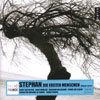Stephan (Die) Ersten Menschen
Eroticism meets Genesis in moody splendour in this French production
View record and artist detailsRecord and Artist Details
Composer or Director: Rudi Stephan
Genre:
Opera
Label: Astrée Naïve
Magazine Review Date: 9/2007
Media Format: CD or Download
Media Runtime: 93
Mastering:
Stereo
DDD
Catalogue Number: V5028

Tracks:
| Composition | Artist Credit |
|---|---|
| (Die) ersten Menschen |
Rudi Stephan, Composer
Donnie Ray Albert, Kajihn, Baritone Franz Hawlata, Adahm, Bass French National Orchestra Mikko Franck, Conductor Nancy Gustafson, Chawa, Soprano Rudi Stephan, Composer Wolfgang Millgramm, Chabel, Tenor |
Author: Mike Ashman
Naïve provides an early chance to renew acquaintance with the Biblical opera that young Rudi Stephan completed and almost got on stage before he was killed by a Russian sniper in 1915. His setting of Otto Borngräber’s “erotic mystery play” clothes the jealousy between Cain (Kajihn) and Abel (Chabel) and their incestuous desire for their mother Eve (Chawa) in moody, late-Romantic orchestral splendour. Strauss’s Frau ohne Schatten and Alpine Symphony and Bartók’s Duke Bluebeard’s Castle were contemporary scores and give some clues to the sound world we’re in but there is nothing second-hand about Stephan’s evoking of decadent primitivism. The Scriabin-like scoring, brought to the fore in this new performance, gives the brass a big colour palette, while a second hearing confirms the composer as a gifted word-setter. Even Kajihn’s generous ranting is never dull to listen to because Stephan’s vocal setting is so cunningly varied.
Whereas the Rickenbacher performance claims that it presents “the (almost) unabridged opera in the original version”, this Paris concert seems to follow the (inauthentic) revisions made by Karl Holl in 1922-23 with a number of cuts, including whole short scenes, and the loss of Chabel’s dying words and Chawa’s important realisation of her feelings for husband and son. The timings of the two sets – the Rickenbacher with generally broader tempi – differ by 20 minutes, a lot with two acts of about an hour each. Also, Nancy Gustafson’s Chawa – younger and more impassioned than Gabriele Maria Ronge’s skilful portrayal for CPO – is sometimes pushed by Stephan’s demanding tessitura.
All that said, however, the new performance has a dramatic sweep lacking in the Rickenbacher. The ending of the opera – the children gone but Adahm realising “a trace of their light continues to glow over us” – is one of those static but transcendental tableaux so beloved of other pre-First World War finales (see Jenufa, Fanciulla, Frau ohne Schatten or Mahler Eight). Franck, the younger maestro (and a regular theatre conductor), steers this to perfection, also managing a bigger and clearer “great blaze” crescendo – anticipations of Bartók’s Fifth Door – when Chawa sees Chabel murdered. Hawlata is an unshakeable pillar as Adahm, Millgramm and Albert wilder, more involved sons than their CPO colleagues, and Gustafson, as hinted above, goes all-out. The French Radio recording is warm and lively. One regret: neither performance makes anything of Stephan’s direction for voices moving offstage, important in Kajihn’s exits.
Whereas the Rickenbacher performance claims that it presents “the (almost) unabridged opera in the original version”, this Paris concert seems to follow the (inauthentic) revisions made by Karl Holl in 1922-23 with a number of cuts, including whole short scenes, and the loss of Chabel’s dying words and Chawa’s important realisation of her feelings for husband and son. The timings of the two sets – the Rickenbacher with generally broader tempi – differ by 20 minutes, a lot with two acts of about an hour each. Also, Nancy Gustafson’s Chawa – younger and more impassioned than Gabriele Maria Ronge’s skilful portrayal for CPO – is sometimes pushed by Stephan’s demanding tessitura.
All that said, however, the new performance has a dramatic sweep lacking in the Rickenbacher. The ending of the opera – the children gone but Adahm realising “a trace of their light continues to glow over us” – is one of those static but transcendental tableaux so beloved of other pre-First World War finales (see Jenufa, Fanciulla, Frau ohne Schatten or Mahler Eight). Franck, the younger maestro (and a regular theatre conductor), steers this to perfection, also managing a bigger and clearer “great blaze” crescendo – anticipations of Bartók’s Fifth Door – when Chawa sees Chabel murdered. Hawlata is an unshakeable pillar as Adahm, Millgramm and Albert wilder, more involved sons than their CPO colleagues, and Gustafson, as hinted above, goes all-out. The French Radio recording is warm and lively. One regret: neither performance makes anything of Stephan’s direction for voices moving offstage, important in Kajihn’s exits.
Explore the world’s largest classical music catalogue on Apple Music Classical.
Included with an Apple Music subscription. Download now.

Gramophone Digital Club
- Digital Edition
- Digital Archive
- Reviews Database
- Events & Offers
From £9.20 / month
Subscribe
Gramophone Club
- Print Edition
- Digital Edition
- Digital Archive
- Reviews Database
- Events & Offers
From £11.45 / month
Subscribe
If you are a library, university or other organisation that would be interested in an institutional subscription to Gramophone please click here for further information.






